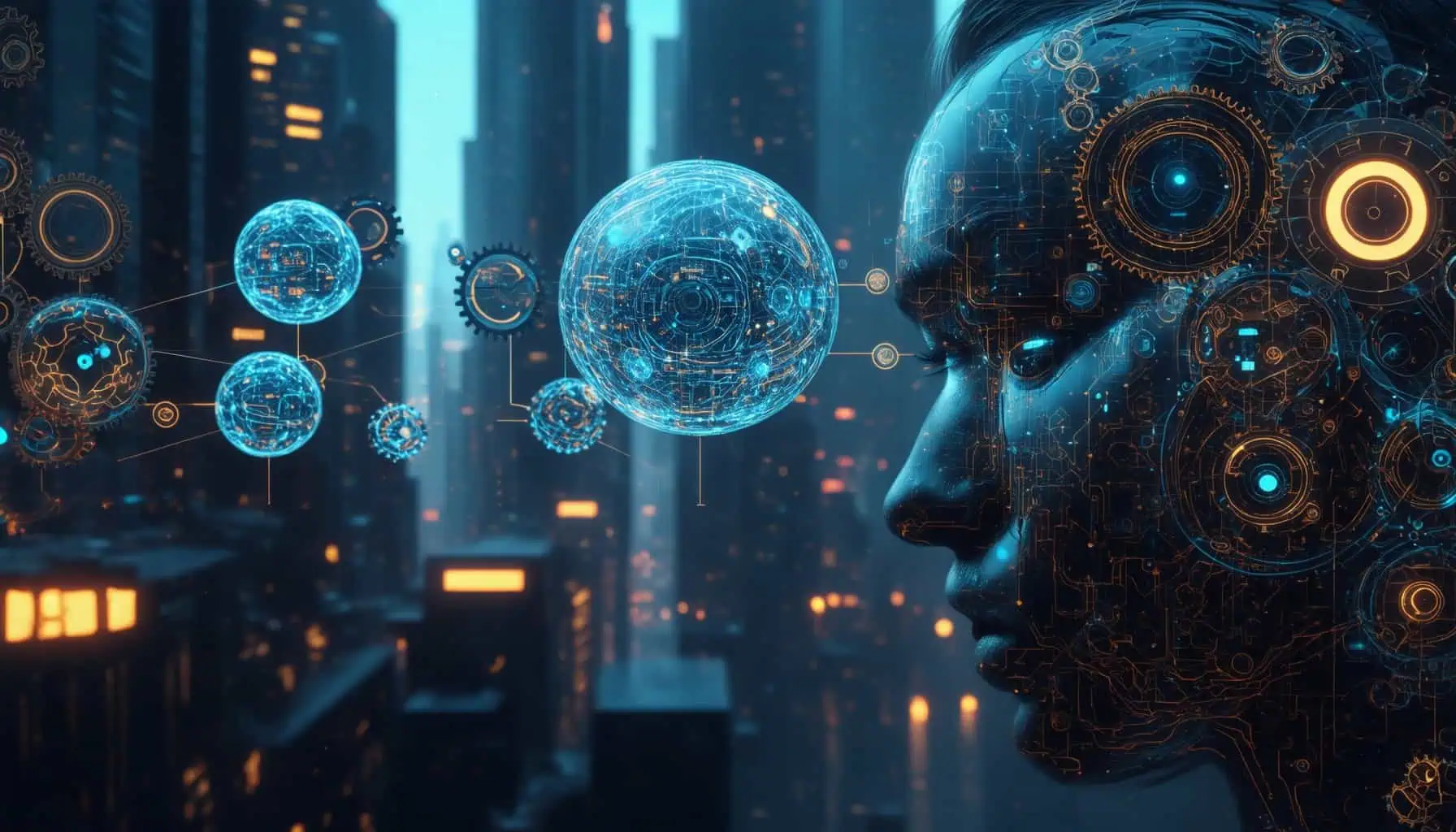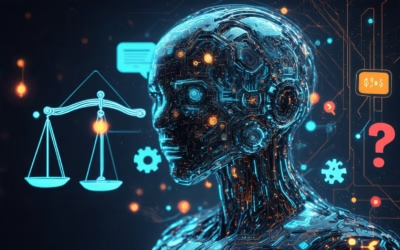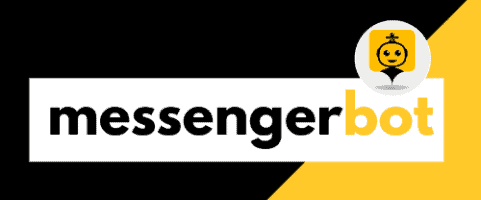Key Takeaways
- Maximize User Engagement: Implementing a real AI chatbot can significantly enhance user interaction and streamline communication processes.
- Cost-Effective Solution: AI chatbots reduce operational costs by automating responses and minimizing the need for large customer service teams.
- Real-Time Capabilities: Modern AI chatbots provide instant responses, ensuring users receive immediate assistance and improving overall satisfaction.
- Personalized Experience: By analyzing user data, AI chatbots can deliver tailored interactions, boosting customer engagement and loyalty.
- Scalable Support: AI chatbots can efficiently manage multiple inquiries simultaneously, making them ideal for businesses with growing demands.
In today’s rapidly evolving digital landscape, the demand for a real AI chatbot has surged, transforming how businesses and individuals interact online. This article delves into the essential aspects of choosing the best AI chatbot, focusing on key factors such as accuracy, real-time capabilities, and cost-effective options. We will explore what defines a chat artificial intelligence and why investing in a realistic AI chat solution can enhance user engagement and streamline communication. Additionally, we will answer pressing questions like, “Which is the most accurate AI chatbot?” and “Is there a real-time AI chat?” By examining various AI chatbot apps and comparing leading solutions like Claude AI and ChatGPT, we aim to provide you with the insights needed to make an informed decision. Join us as we uncover the benefits of AI chatbots and guide you through the landscape of chatbots artificial intelligence to find the perfect fit for your needs.
Understanding AI Chatbots: What is an AI Chatbot?
An AI chatbot is a sophisticated software application designed to simulate human conversation through artificial intelligence. These chatbots utilize natural language processing (NLP) to understand and respond to user inquiries in a conversational manner. By leveraging machine learning algorithms, AI chatbots can learn from interactions, improving their responses over time. This technology is increasingly used across various platforms, including websites, social media, and messaging apps, to enhance user engagement and streamline communication.
Benefits of AI Chatbots: Why Use a Real AI Chatbot?
Integrating a real AI chatbot into your communication strategy offers numerous benefits that can significantly enhance user experience and operational efficiency. Here are some key advantages:
- 24/7 Availability: AI chatbots can operate around the clock, providing immediate responses to user inquiries at any time, which is crucial for businesses with a global audience.
- Cost Efficiency: Utilizing AI chatbots can reduce operational costs by minimizing the need for extensive customer service teams. This allows businesses to allocate resources more effectively.
- Personalized Interactions: Advanced AI chatbots can analyze user data to deliver tailored responses, improving customer satisfaction and engagement.
- Scalability: AI chatbots can handle multiple conversations simultaneously, making them ideal for businesses experiencing high volumes of inquiries.
- Data Collection and Insights: Chatbots can gather valuable data on user preferences and behaviors, enabling businesses to refine their strategies and improve services.
Is there a real-time AI chat?
Yes, real-time AI chat capabilities are a hallmark of modern AI chatbots. These systems are designed to provide instant responses, ensuring that users receive immediate assistance. The technology behind real-time AI chat involves advanced algorithms that process user inputs and generate relevant replies almost instantaneously. This feature is particularly beneficial for businesses looking to enhance customer support and engagement.
Real-Time Capabilities of AI Chatbots
The real-time capabilities of AI chatbots stem from their ability to analyze and interpret user queries quickly. This is achieved through:
- Natural Language Processing: NLP allows chatbots to understand the context and intent behind user messages, enabling them to respond accurately.
- Machine Learning: As chatbots interact with users, they learn from these exchanges, continuously improving their response accuracy and relevance.
- Integration with Messaging Platforms: Many AI chatbots can be integrated into popular messaging apps, allowing for seamless real-time communication.
For more insights on how AI chatbots can transform your business communication, explore our Understanding AI Chatbot Uses.

Understanding AI Chatbots: What is an AI Chatbot?
A real AI chatbot is an advanced software application that utilizes chat artificial intelligence to simulate human-like conversations with users. These chatbots are designed to understand and respond to inquiries in a manner that feels natural and engaging. By leveraging machine learning and natural language processing (NLP), AI chatbots can interpret user intent, manage complex queries, and provide accurate responses. This technology is increasingly being integrated into various platforms, allowing businesses to enhance customer interactions and streamline communication.
Real-Time Capabilities of AI Chatbots
Yes, there are real-time AI chat solutions available that utilize advanced conversational AI technology. These chatbots are designed to provide interactive and engaging experiences for users, making them suitable for various applications, including customer service, virtual assistance, and digital marketing.
- Real-Time Interaction: Modern AI chatbots can engage in real-time conversations, allowing businesses to respond to customer inquiries instantly. This capability enhances user satisfaction and improves overall engagement.
- Lifelike Digital Humans: Companies like D-ID are pioneering the use of lifelike digital humans in their AI chat solutions. These digital avatars can communicate with users in a more relatable and human-like manner, making interactions feel more personal and engaging.
- Integration with Workflows: Real-time AI chat solutions can be seamlessly integrated into existing business workflows. This integration allows for a smoother transition between automated responses and human support when necessary, ensuring that users receive the assistance they need without delays.
- Applications: Real-time AI chat can be utilized in various sectors, including e-commerce, healthcare, and education. For instance, businesses can use chatbots to handle customer inquiries, while educational institutions can implement them to provide students with instant access to information.
- Technological Advancements: Recent advancements in natural language processing (NLP) and machine learning have significantly improved the capabilities of AI chatbots. These technologies enable chatbots to understand context, manage complex queries, and learn from interactions to enhance future performance.
For more information on the effectiveness of AI chat solutions, refer to studies published by the Journal of Artificial Intelligence Research and industry reports from Gartner.
The Role of AI in Realistic Chat
The role of AI in creating realistic chat experiences cannot be overstated. With the evolution of AI chatbots, businesses can now offer realistic AI chat interactions that mimic human conversation. This is achieved through sophisticated algorithms that analyze user inputs and generate contextually relevant responses.
Moreover, the integration of AI chat apps into customer service frameworks allows for a more personalized approach. By utilizing data analytics, these chatbots can tailor their responses based on user history and preferences, enhancing the overall user experience. As a result, businesses can foster stronger relationships with their customers, leading to increased loyalty and satisfaction.
To explore the various applications of AI chatbots and their benefits, check out our detailed guide on Understanding AI Chatbot Uses.
Benefits of AI Chatbots: Why Use a Real AI Chatbot?
Utilizing a real AI chatbot can significantly enhance user engagement and streamline communication processes. The benefits of chatbots are numerous, making them an essential tool for businesses looking to optimize their customer interactions. Here are some key advantages of implementing a real AI chatbot:
- 24/7 Availability: A real AI chatbot can provide round-the-clock support, ensuring that users can get answers to their questions at any time, which enhances customer satisfaction.
- Cost Efficiency: By automating responses and handling multiple inquiries simultaneously, businesses can reduce operational costs associated with customer service.
- Personalized Interactions: AI chatbots can analyze user data to offer tailored responses, creating a more personalized experience that can lead to higher engagement rates.
- Scalability: As your business grows, a real AI chatbot can easily scale to handle increased traffic without the need for additional human resources.
- Data Collection and Insights: AI chatbots can gather valuable data on user interactions, helping businesses understand customer preferences and improve their services.
Is There a Real-Time AI Chat?
Yes, real-time AI chat capabilities are a hallmark of modern AI chatbots. These systems leverage advanced chat artificial intelligence to provide immediate responses to user inquiries. This real-time interaction is crucial for maintaining user engagement and satisfaction. Here are some features that enhance real-time capabilities:
- Instant Responses: Real AI chatbots can process and respond to user queries in seconds, ensuring that users do not have to wait for assistance.
- Contextual Understanding: Advanced AI chatbots utilize natural language processing (NLP) to understand the context of conversations, allowing for more relevant and accurate responses.
- Multi-Channel Support: Many real-time AI chatbots can operate across various platforms, including websites and social media, providing consistent support wherever users engage.
Is There Any Free AI Chatbot?
Yes, there are several free AI chatbots available that you can use to interact and ask questions. Here are some notable options:
- ChatGPT by OpenAI: This advanced AI chatbot can engage in conversations, answer questions, and provide information on a wide range of topics. It is user-friendly and accessible through various platforms.
- Replika: A personal AI companion that learns from your interactions. It is designed to provide emotional support and engage in meaningful conversations, making it a unique option for users looking for companionship.
- Cleverbot: An AI chatbot that has been around for years, Cleverbot learns from its interactions with users and can hold conversations on various topics. It’s known for its quirky and sometimes humorous responses.
- Google Assistant: While primarily a virtual assistant, Google Assistant can also engage in conversational interactions and answer questions. It is available on smartphones and smart home devices.
- Messenger Bots: Many businesses utilize Messenger Bots on platforms like Facebook to provide customer support and answer inquiries. These bots can be programmed to handle a variety of questions and provide instant responses.
These chatbots are free to use and can provide valuable assistance, whether for casual conversation or specific inquiries. Always ensure to check the privacy policies of these services to understand how your data is handled.
Which AI is Better Than ChatGPT?
When evaluating the landscape of AI chatbots, many users often wonder which options surpass ChatGPT in terms of functionality and performance. While ChatGPT is a popular choice for conversational AI, several alternatives offer unique features that may better suit specific needs. Here, we compare notable contenders, focusing on their strengths and capabilities.
Comparing AI Chatbots: Claude AI vs. ChatGPT
Claude AI stands out for its human-like writing style and conversational abilities, making it an excellent choice for users seeking a more natural dialogue experience. Its context understanding and nuanced responses can enhance user engagement significantly. In contrast, ChatGPT excels in generating coherent text but may lack the depth of interaction that Claude AI provides. For those looking for a chatbot that mimics human conversation closely, Claude AI is a strong alternative.
Another noteworthy competitor is Gemini by Google, which integrates seamlessly with the Google ecosystem. Its multimodal capabilities allow it to handle various tasks, from content creation to complex data analysis. This versatility can be particularly beneficial for businesses that require a chatbot capable of performing multiple functions. While ChatGPT remains a robust option for general use, Gemini’s advanced features may offer additional value for users with diverse needs.
The Best AI Chatbot: Features and Performance
When determining the best AI chatbot, it’s essential to consider the specific features that enhance user experience. For instance, Jasper.ai specializes in content creation, providing tools that help marketers generate engaging copy efficiently. This focus on marketing makes Jasper.ai a top choice for businesses aiming to optimize their content strategies.
Additionally, HuggingChat offers a broader range of features compared to many alternatives, making it suitable for both casual conversation and advanced data processing. Its open-source framework allows for continuous improvement, which can be a significant advantage for developers looking to customize their AI solutions.
Ultimately, the best AI chatbot depends on individual requirements. Whether you prioritize conversational depth, multimodal capabilities, or content creation, exploring various options will help you find the right fit for your needs. For further insights on AI chatbots and their applications, check out our guide on Understanding AI Chatbot Uses.

What is the Smartest AI Right Now?
In the rapidly evolving world of artificial intelligence, identifying the smartest AI can be subjective, depending on the specific applications and capabilities being evaluated. However, several contenders stand out in 2023 for their advanced functionalities and performance.
The Evolution of AI Intelligence Bots
The landscape of AI intelligence bots has transformed significantly over the years. From basic chatbots to sophisticated AI systems, the evolution has been driven by advancements in machine learning, natural language processing, and data analytics. Today, we see AI chatbots that not only engage in realistic conversations but also perform complex tasks, making them invaluable tools for businesses and individuals alike.
Some of the most notable AI chatbots include:
- Grok-3: Developed by Elon Musk’s xAI, Grok-3 is recognized for its exceptional reasoning capabilities, making it a strong contender in various applications, including natural language understanding.
- DeepSeek-v3 r1: This open-source model from China excels in academic research and STEM-related tasks, showcasing remarkable problem-solving skills.
- ChatGPT: OpenAI’s ChatGPT remains a favorite for its ability to generate human-like text and provide customized responses across multiple domains.
- GPT-4o: The latest from OpenAI, GPT-4o offers enhanced conversational skills and versatility, solidifying its position as a leading AI model.
Top Smart AI Chatbots in 2023
As we assess the smartest AI chatbots available, several key features contribute to their intelligence:
- Advanced Natural Language Processing: The ability to understand and generate human-like responses is crucial for effective communication.
- Contextual Understanding: Smart AI chatbots can maintain context over multiple interactions, providing a more coherent and engaging user experience.
- Learning Capabilities: The best AI chatbots continuously learn from interactions, improving their responses and functionalities over time.
In conclusion, the smartest AI chatbots today leverage cutting-edge technology to deliver realistic and intelligent interactions. As AI continues to advance, these bots will play an increasingly vital role in enhancing communication and automating tasks across various sectors.
What AI Gives the Most Accurate Answers?
When considering which AI provides the most accurate answers, several platforms have emerged as leaders in the field of AI question-answering tools. Here are some of the top contenders for 2025:
- Copilot: Widely recognized for its high accuracy and user-friendly interface, Copilot utilizes advanced natural language processing (NLP) algorithms and a comprehensive knowledge base to deliver real-time, contextually relevant answers. According to a study by OpenAI, Copilot’s ability to understand nuanced queries significantly enhances its response accuracy.
- Google Bard: Leveraging Google’s extensive data resources, Bard excels in providing precise answers across a wide range of topics. Its integration with Google’s search capabilities allows it to pull in the latest information, making it a reliable choice for users seeking up-to-date responses.
- ChatGPT: Developed by OpenAI, ChatGPT is known for its conversational abilities and depth of knowledge. It can generate detailed responses and engage in multi-turn conversations, making it suitable for complex inquiries. Research indicates that ChatGPT’s training on diverse datasets contributes to its accuracy and relevance.
- IBM Watson: Watson’s AI capabilities are particularly strong in specialized fields such as healthcare and finance. Its ability to analyze large datasets and provide insights based on empirical data makes it a trusted tool for professionals seeking accurate information.
- Microsoft Azure AI: This platform offers robust AI services, including question-answering capabilities that are integrated with various applications. Its machine learning models are designed to improve over time, enhancing accuracy with each interaction.
- Jasper AI: Known for its content generation capabilities, Jasper AI also provides accurate answers to user queries by leveraging its extensive training on diverse content types. Its focus on marketing and creative writing makes it a unique option for users in those fields.
- Hugging Face Transformers: This open-source platform allows developers to create customized AI models for specific applications, including question answering. Its flexibility and community-driven approach enable high accuracy tailored to user needs.
- Rasa: Rasa is an open-source conversational AI framework that allows businesses to build highly accurate chatbots. Its focus on contextual understanding and user intent makes it a powerful tool for delivering precise answers.
- Kuki Chatbot: Kuki is designed for engaging conversations and can provide accurate answers based on its extensive training. Its ability to learn from interactions helps improve its response accuracy over time.
- Messenger Bot: While not primarily a question-answering tool, Messenger Bot can provide accurate responses within its defined scope, particularly for customer service inquiries. Its integration with Facebook’s ecosystem allows it to access a wide range of information quickly.
In conclusion, the most accurate AI question-answering tools in 2025 include Copilot, Google Bard, ChatGPT, IBM Watson, Microsoft Azure AI, Jasper AI, Hugging Face Transformers, Rasa, Kuki, and Messenger Bot. Each of these platforms utilizes advanced algorithms and vast knowledge bases to deliver precise and relevant answers, making them valuable resources for users seeking accurate information.
Accuracy in AI Chatbots: Key Factors
Achieving high accuracy in AI chatbots involves several key factors:
- Data Quality: The quality of training data significantly impacts the chatbot’s ability to provide accurate responses. High-quality, diverse datasets lead to better understanding and contextual awareness.
- Natural Language Processing (NLP): Advanced NLP techniques enable chatbots to comprehend user intent and nuances in language, enhancing their ability to respond accurately.
- Continuous Learning: AI chatbots that utilize machine learning can improve over time by learning from user interactions, which helps refine their accuracy.
- User Feedback: Incorporating user feedback into the training process allows chatbots to adjust and improve their responses based on real-world usage.
By focusing on these factors, businesses can enhance the accuracy of their real AI chatbot solutions, ensuring they meet user expectations effectively.
What AI Gives the Most Accurate Answers?
When evaluating which AI provides the most accurate answers, it’s essential to consider several factors that contribute to the performance of real AI chatbots. Accuracy in AI chatbots is influenced by the underlying algorithms, the quality of training data, and the ability to understand context. Among the leading contenders in this space, ChatGPT and Claude AI are often compared for their capabilities in delivering precise responses.
Accuracy in AI Chatbots: Key Factors
The accuracy of an AI chatbot can be attributed to various key factors:
- Natural Language Processing (NLP): Advanced NLP techniques enable chatbots to comprehend user queries more effectively, allowing for more accurate responses.
- Training Data Quality: The breadth and depth of the training data significantly impact the chatbot’s ability to provide accurate answers. High-quality, diverse datasets lead to better understanding and contextual awareness.
- Continuous Learning: AI chatbots that utilize machine learning can adapt over time, improving their accuracy based on user interactions and feedback.
- Contextual Understanding: The ability to grasp the context of a conversation is crucial. Chatbots that can maintain context throughout a dialogue tend to provide more relevant and accurate answers.
For instance, Brain Pod AI offers a robust AI chat assistant that excels in delivering accurate responses by leveraging advanced NLP and extensive training datasets. This ensures that users receive reliable information when they chat with bots online.
Evaluating AI Chatbot Performance
To determine which AI chatbot gives the most accurate answers, consider the following evaluation criteria:
- User Feedback: Analyzing user reviews and feedback can provide insights into the accuracy and reliability of different chatbots.
- Benchmark Tests: Many AI chatbots undergo standardized tests to measure their performance against specific benchmarks, helping to identify the most accurate options.
- Real-World Applications: Observing how well chatbots perform in real-world scenarios, such as customer service or technical support, can indicate their accuracy and effectiveness.
In conclusion, while there are several best AI chatbots available, the accuracy of responses can vary significantly based on the factors mentioned above. By focusing on these elements, users can select an AI chatbot that meets their needs for reliable and accurate information.





